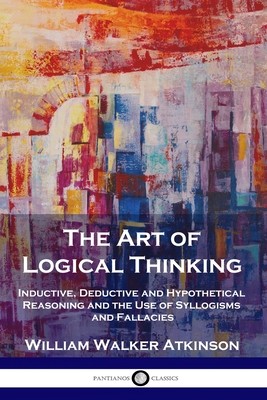
- We will send in 10–14 business days.
- Author: William Walker Atkinson
- Publisher: Pantianos Classics
- ISBN-10: 1789872979
- ISBN-13: 9781789872972
- Format: 15.2 x 22.9 x 0.5 cm, softcover
- Language: English
- SAVE -10% with code: EXTRA
Reviews
Description
William Walker Atkinson, an attorney by trade, explains different kinds of logic and reasoning - deductive, inductive and hypothetical.
The author begins by describing how the mind forms ideas and concepts, and then subjects these to the mental processes of higher reasoning. The memory stores a repository of terms, which are different from concepts in that they apply exclusively to the name of things. Through reasoning the mind can arrive at a judgment of a given thing or idea, and through simple distinction can reject what is false - for instance, the notion that a horse is a cow.
Moving on from these simple examples, Atkinson describes how complex judgments and analyses are formed by the mind. Piecing together an accurate chain of events forms a kind of inductive reasoning - for example, if several people enters a store empty-handed, and later emerge with bags of fruit and vegetables, is it sensible to infer that it is a grocery store. Deriving conclusions from facts and events is forming a hypothesis; with the use of information, assertions can be made to arrive at a sensible conclusion - without personally entering said store, based on known facts it is credible to hypothesize that it sells groceries.
- Author: William Walker Atkinson
- Publisher: Pantianos Classics
- ISBN-10: 1789872979
- ISBN-13: 9781789872972
- Format: 15.2 x 22.9 x 0.5 cm, softcover
- Language: English English
William Walker Atkinson, an attorney by trade, explains different kinds of logic and reasoning - deductive, inductive and hypothetical.
The author begins by describing how the mind forms ideas and concepts, and then subjects these to the mental processes of higher reasoning. The memory stores a repository of terms, which are different from concepts in that they apply exclusively to the name of things. Through reasoning the mind can arrive at a judgment of a given thing or idea, and through simple distinction can reject what is false - for instance, the notion that a horse is a cow.
Moving on from these simple examples, Atkinson describes how complex judgments and analyses are formed by the mind. Piecing together an accurate chain of events forms a kind of inductive reasoning - for example, if several people enters a store empty-handed, and later emerge with bags of fruit and vegetables, is it sensible to infer that it is a grocery store. Deriving conclusions from facts and events is forming a hypothesis; with the use of information, assertions can be made to arrive at a sensible conclusion - without personally entering said store, based on known facts it is credible to hypothesize that it sells groceries.


Reviews